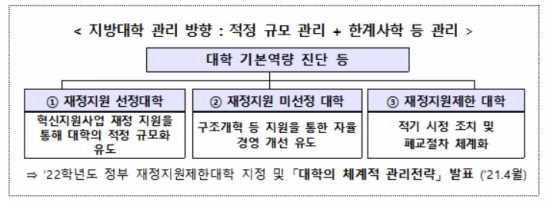Announced the Ministry of Education’s’Local University/Regional Balanced Talent Support Plan’
Expansion of shared growth models such as community-specific shared universities
Reinforcement of management such as systematization of schools with limited financial support

[아시아경제 한진주 기자] To respond to the outflow of local talent and a decline in the school-age population, the government has proposed carrots and sticks. Expand high school education innovation models, such as shared universities and regional innovation platforms, to strengthen local university capabilities. At the same time, management from appropriate scale up to closure of schools will be strengthened in connection with local university financial aid restrictions.
On the 28th, the Ministry of Education announced the ‘2nd Local University and Regional Balanced Talent Nurturing Support Plan’ with 14 municipalities in the relevant ministries and non-metropolitan areas. This plan is established every five years in accordance with the Local University Promotion Act.
According to the National Statistical Office, a net outflow of the population in their 20s occurred in 13 provinces excluding the metropolitan area and Sejong in 2019. Although there are complex factors such as jobs, education, and housing, both the outflow at the college entrance stage and the job search stage are increasing. The net outflow of people in their 20s by region was Jeonbuk (-4.5%), Jeonnam (-4.2%), Gyeongbuk and Gyeongnam (-3.3%), followed by Sejong (9.3%) and Seoul (3.3%).
In particular, the population of small private colleges is intensifying than in the metropolitan area, junior colleges rather than general colleges, and national universities. Last year, the number of unfilled personnel in the metropolitan area was 2,170 and 11,986 in the non-metropolitan area, five times more. The recruitment rate of local national universities was 99.8%, but the recruitment rate of small private universities was only 85.4%.
As the difficulty in introducing excellent talent from local universities increased, the Ministry of Education prepared a support plan for fostering local universities in order to improve the constitution and foster distinctive local universities. The second basic plan focused on re-establishing the role of local units to prevent the outflow of local talent. Key tasks were set based on the framework of ▲university innovation ▲local innovation ▲collaboration.
University innovation eases regulations and supports financial expansion so that local universities can grow together through collaboration. Based on cooperation between local governments and universities, a shared growth-type ecosystem will be established through a regional-specific shared university model and a digital innovation shared university that will be promoted from this year. By designating the regional innovation platform region as a’higher education innovation specialized region’, higher education regulations will be suspended for up to six years, and core standards related to university operation will be greatly relaxed.

Institutionalize the regional balance of university financial support projects and integrate the existing national university projects in stages. In addition, through the enactment of the National University Law, a plan for financial expansion and efficiency improvement will be prepared, and a plan for financial expansion of higher education will be established by September. The selection of local talents is mandatory in specialized graduate schools in the medical, pharmaceutical, and nursing fields of local universities, and the standards for local talent are also strengthened.
It also supports local university specialization. Creating a leading model for internationalization of education of excellent local universities, such as activating online joint degree programs with foreign universities, and gradually expanding the proportion of local universities in the government’s scholarship program (GKS). The third stage industry-academia cooperation leading university development project will be promoted to support the cultivation of local New Deal talent.
Systematic management for qualitative innovation at local universities, including universities with limited government funding, will also be strengthened. The Ministry of Education plans to designate a college with limited financial support in April and announce a systematic management strategy. Financial support-selected universities apply the maintenance and fill rate to induce the appropriate size of the quota, and unselected universities promote deregulation such as structural reform to promote autonomous management improvement. Universities with limited financial support have a rapid liquidation system by systematizing the closing procedures.

The work is also carried out to create high-quality jobs for local talents to settle in and friendly settlement conditions. Promote campus space innovation to promote corporate inflow. By 2025, we will support the creation of five’urban convergence special zones’ and integrate education, start-ups, culture, and residential spaces in connection with the’regional innovation platform’ project. The’Campus Innovation Park’, which creates urban high-tech industrial complexes on campus, will be expanded to five this year, and new special cases will be established to enable the relocation of campuses within the innovative city industry-academia-research cluster.
Deputy Prime Minister Yu Eun-hye and Minister of Education said, “As the outflow of talented people in the metropolitan area is not only due to education problems, but also from complex factors such as jobs and settlement conditions, a comprehensive approach is necessary.” “University and area·Collaboration between various institutions is paramount for sharing and shared growth between fields, and we will support the innovation of universities and regions by smoothly proceeding with the basic plan.”
Reporter Han Jin-ju [email protected]
